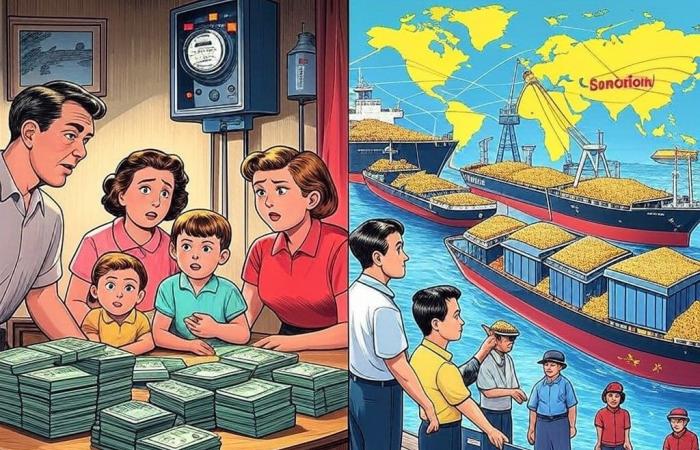– Advertisement –
The war in Ukraine has triggered an unprecedented wave of sanctions against Russia, upending the global economy. These measures, taken by Western powers to economically isolate Moscow, have repercussions well beyond Russian borders. Rising energy prices, disruptions in supply chains and the reorganization of global economic alliances are redefining geopolitical balances.
A massive and coordinated response
Sanctions imposed by the United States, the European Union and their allies include trade restrictions, the freezing of Russian assets abroad, and transaction bans for major Russian banks. Russia has also been excluded from the SWIFT interbank messaging system, a key tool for international payments. These sanctions aim to suffocate the Russian economy by limiting its access to global financial markets and reducing its export revenues.
However, these measures have not only affected Russia. They have also had considerable repercussions for the countries imposing these sanctions. The interdependence of global economies has turned these decisions into a double-edged sword, impacting supply chains and commodity prices.
Impact on energy markets
One of the sectors most affected by sanctions is energy. Before the conflict, Russia was one of the world’s leading exporters of natural gas and oil. Restrictions on its exports have disrupted global markets, causing prices to soar. In 2022, oil prices reached record levels, exceeding $120 per barrel, before stabilizing.
Europe, which was heavily dependent on Russian gas, had to quickly diversify its sources of supply, turning to liquefied natural gas (LNG) from the United States and Qatar. This transition, although essential for reducing energy dependence, has brought considerable costs for European consumers, worsening the energy crisis already exacerbated by the conflict.
At the same time, Russia has redirected its energy exports towards Asia, particularly China and India. This reorientation has strengthened economic relations between Moscow and these emerging powers, changing the geography of global energy trade.
Disruptions in supply chains
Besides energy, sanctions have disrupted global supply chains, particularly in the agriculture and industrial sectors. Russia and Ukraine are among the world’s largest exporters of grain, particularly wheat and corn. Restrictions on Russian exports, combined with logistical disruptions in Ukraine, have led to shortages and rising food prices.
These disruptions have particularly affected developing countries, which rely on imports of these essential commodities. North Africa and the Middle East, for example, have faced a major food crisis, threatening the food security of millions of people.
In industry, sanctions on Russian metals, such as aluminum and nickel, have disrupted production in the automotive and electronics sectors, increasing costs for manufacturers and consumers.
A reconfiguration of economic alliances
Sanctions have also accelerated the reorganization of global economic alliances. Russia, excluded from Western markets, has strengthened its partnerships with countries not aligned with sanctions, such as China, India, and certain Middle Eastern countries. This realignment gave rise to new trade routes, reducing Moscow’s dependence on Europe.
At the same time, the BRICS (Brazil, Russia, India, China and South Africa) have intensified their cooperation to circumvent sanctions. The idea of a common currency, intended to reduce dependence on the US dollar in international transactions, has been discussed, although its implementation remains uncertain.
However, this fragmentation of economic alliances poses long-term challenges for the stability of global trade. The rise of competing economic blocs could exacerbate geopolitical tensions and weaken multilateral institutions.
The cost of sanctions for Europe and the United States
While sanctions have succeeded in isolating Russia economically, they also come at a high cost for the countries that impose them. In Europe, the energy crisis has worsened inflation, reduced household purchasing power, and put pressure on energy-consuming industries, such as metallurgy and chemicals.
In the United States, although the impact is less direct, companies with business ties to Russia have suffered significant losses. Furthermore, global inflation, exacerbated by the energy crisis, weighed on the American economy, forcing the Federal Reserve to aggressively raise its interest rates to contain it.
Resilience of the Russian economy
Despite the scale of the sanctions, the Russian economy has shown some resilience. Thanks to government support measures and financial reserves accumulated before the conflict, Russia has managed to stabilize its currency and maintain modest growth in some sectors.
However, this resilience has its limits. Limited access to Western technologies and difficulties in diversifying supply chains weigh heavily on key sectors, such as the oil industry and international trade. In the long term, sanctions could significantly weaken the Russian economy, although their effectiveness is still debated.
Towards a new global economic era
The war in Ukraine and the resulting sanctions mark a turning point in the global economy. Disruptions in supply chains, rising geopolitical tensions, and the fragmentation of economic alliances are calling into question the principles of globalization.
For Western countries, managing the secondary impacts of sanctions remains a major challenge. Strengthened cooperation and coordinated economic policies will be necessary to limit the impact on their own economies while maintaining pressure on Russia.
– Advertisement –






